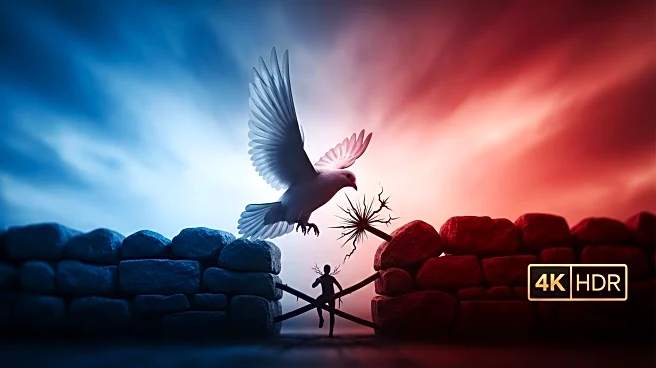What's Happening?
The Israeli Defense Forces (IDF) have identified the bodies of hostages Guy Ilouz and Bipin Joshi, along with two others, amidst ongoing conflict in Gaza. According to the IDF, Bipin Joshi was murdered
in captivity during the initial months of the Gaza war. Guy Ilouz succumbed to injuries sustained on October 7, reportedly due to inadequate medical care. The identification of these bodies highlights the severe human toll of the conflict, which has seen numerous hostages taken and casualties reported. The situation remains tense as the conflict continues, with families of hostages facing uncertainty and grief.
Why It's Important?
The identification of hostages' bodies underscores the grave humanitarian impact of the Gaza conflict. It highlights the challenges faced by hostages and their families, who endure prolonged periods of uncertainty and distress. The situation also raises questions about the conditions of captivity and the adequacy of medical care provided to hostages. This development may influence international perspectives on the conflict, potentially affecting diplomatic relations and humanitarian efforts. The ongoing identification of hostages could lead to increased pressure on involved parties to negotiate for the release of remaining captives and address the humanitarian crisis.
What's Next?
As the conflict persists, further identification of hostages and casualties is expected. This may prompt international calls for ceasefire and negotiations to secure the release of remaining hostages. Humanitarian organizations might intensify efforts to provide aid and support to affected families. The Israeli government and military could face increased scrutiny regarding their handling of the hostage situation and the broader conflict. Diplomatic efforts may be initiated to address the humanitarian crisis and seek resolutions to the ongoing hostilities.
Beyond the Headlines
The identification of hostages' bodies raises ethical concerns about the treatment of captives and the responsibilities of warring parties to ensure humane conditions. It also highlights the psychological impact on families awaiting news of their loved ones. The conflict's continuation may lead to long-term shifts in regional dynamics, affecting peace prospects and international relations. The humanitarian crisis could prompt discussions on international intervention and the role of global organizations in conflict resolution.









